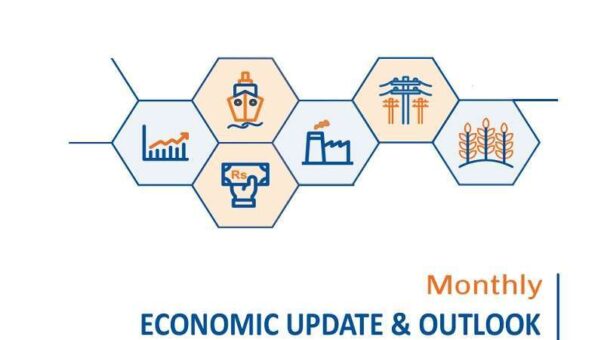Islamabad, July 28, 2025 – The Finance Ministry has cautioned that recent heavy rains may pose inflationary risks due to their adverse effects on agriculture yields and supply chain dynamics.
In its Monthly Economic Update for July 2025, the Finance Ministry highlighted that although inflation is currently under control, weather disruptions could reverse this trend by impacting the food supply chain, increasing costs of perishable items, and triggering broader inflationary pressures.
Despite these risks, the Finance Ministry expressed optimism over Pakistan’s economic performance at the close of FY2025 and the outlook for FY2026. The economy posted a growth rate of 2.68% while inflation fell significantly to 4.5%—a steep decline from last year’s 23.4%—due to lower policy rates, stable exchange rates, and improved macroeconomic management. The current account recorded a surplus of $2.1 billion, marking the first annual surplus in 14 years, aided by robust exports and record-high remittances of $38.3 billion, largely from Saudi Arabia and the UAE.
Looking ahead, the Finance Ministry anticipates that the economy will maintain its momentum, projecting 4.2% GDP growth for FY2026. Key policy priorities include fiscal consolidation, enhanced revenue collection, modernization of agriculture and industry, and climate resilience. The agriculture sector is expected to rebound, supported by increased disbursement of agricultural credit (Rs. 2,300 billion) and higher imports of machinery.
The Large-Scale Manufacturing (LSM) sector also showed promising signs, with month-on-month growth of 7.9% in May 2025, driven by rising production in automobiles, textiles, and petroleum products. Cement exports surged by nearly 30%, even as domestic sales slightly dipped.
The fiscal front also showed improvement. The fiscal deficit reduced to 3.7% of GDP, while the primary surplus rose to 3.1% due to restrained spending and higher revenue collection. The Federal Board of Revenue (FBR) recorded a 26.3% increase in tax revenues, including notable growth in direct taxes, sales tax, and excise duties.
Foreign investment trends were mixed. Net Foreign Direct Investment (FDI) rose by 4.7% to $2.5 billion, led by the power and financial sectors. However, there were net outflows in both private and public portfolio investments. Nonetheless, foreign exchange reserves rose to $19.9 billion by mid-July 2025, including $14.5 billion held by the State Bank of Pakistan (SBP), underscoring external sector stability.
The Consumer Price Index (CPI) averaged 4.5% in FY2025, down from 23.4% the year prior. However, the Finance Ministry reiterated that weather-induced supply disruptions—particularly from heavy rains—could put pressure on food prices and contribute to an inflationary uptick in the coming months.
The Finance Ministry emphasized that careful monitoring of weather patterns and strategic management of food supplies will be critical to sustaining price stability. Enhanced coordination between provincial departments and federal agencies will also be required to manage climate-linked shocks and ensure food security.
